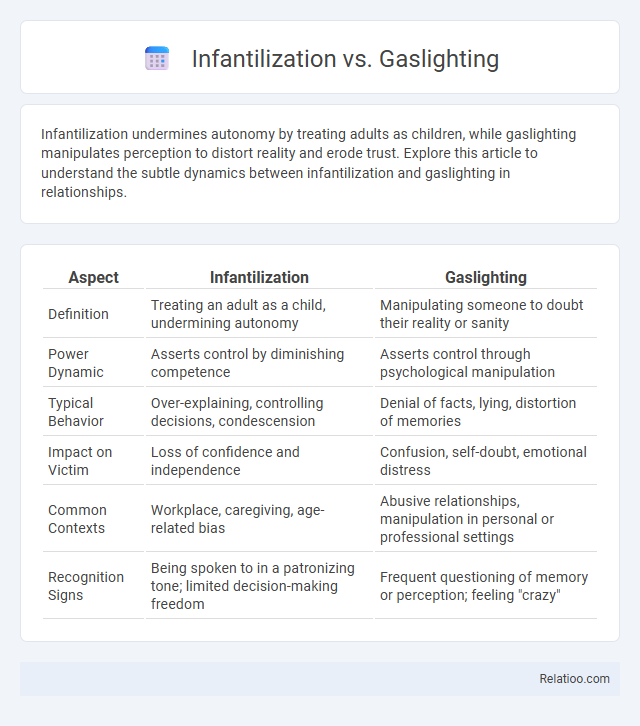Infantilization undermines autonomy by treating adults as children, while gaslighting manipulates perception to distort reality and erode trust. Explore this article to understand the subtle dynamics between infantilization and gaslighting in relationships.
Table of Comparison
| Aspect | Infantilization | Gaslighting |
|---|---|---|
| Definition | Treating an adult as a child, undermining autonomy | Manipulating someone to doubt their reality or sanity |
| Power Dynamic | Asserts control by diminishing competence | Asserts control through psychological manipulation |
| Typical Behavior | Over-explaining, controlling decisions, condescension | Denial of facts, lying, distortion of memories |
| Impact on Victim | Loss of confidence and independence | Confusion, self-doubt, emotional distress |
| Common Contexts | Workplace, caregiving, age-related bias | Abusive relationships, manipulation in personal or professional settings |
| Recognition Signs | Being spoken to in a patronizing tone; limited decision-making freedom | Frequent questioning of memory or perception; feeling "crazy" |
Understanding Infantilization: Definition and Examples
Infantilization refers to treating an adult like a child by undermining their autonomy and dismissing their opinions, often manifesting in actions such as speaking in a condescending tone or making decisions on their behalf without consent. Gaslighting differs as it involves manipulating someone into doubting their own reality or memory, causing psychological harm through deceit rather than overt control. Understanding infantilization helps you recognize subtle dynamics of control and dependency, often seen in caregiving, workplace, or intimate relationships, where respect for individual competence is essential.
What is Gaslighting? Key Signs and Tactics
Gaslighting is a psychological manipulation technique where a person deliberately distorts reality to make you doubt your own perceptions, memories, or sanity. Key signs include frequent denial of your experiences, trivializing your emotions, and persistent lying or misinformation to confuse and control you. Tactics often involve contradiction, withholding information, and shifting blame to undermine your confidence and independence.
Core Differences Between Infantilization and Gaslighting
Infantilization involves treating an adult as if they were a child, undermining their autonomy and decision-making ability, whereas gaslighting is a form of psychological manipulation designed to make someone doubt their own perceptions and reality. The core difference lies in intent: infantilization infantilizes to control through belittlement and denial of maturity, while gaslighting distorts truth to create confusion and insecurity. Both tactics erode confidence but infantilization targets perceived immaturity, and gaslighting attacks the victim's grasp of reality.
How Infantilization Manifests in Relationships
Infantilization in relationships manifests through persistent behaviors that treat an adult partner as a child, undermining their autonomy and decision-making capabilities. This dynamic includes controlling actions, dismissive attitudes, and excessive unsolicited guidance that diminish the partner's confidence and agency. Such treatment often leads to emotional dependency and erodes personal boundaries, distinguishing it from gaslighting, which involves manipulation aimed at distorting reality and self-perception.
Psychological Impact of Gaslighting on Victims
Gaslighting inflicts severe psychological damage by causing victims to question their own memory, perception, and sanity, often leading to anxiety, depression, and diminished self-esteem. Unlike infantilization and infantalization, which impose a condescending, patronizing treatment that undermines autonomy, gaslighting manipulates reality to erode a person's trust in themselves. This persistent psychological abuse can result in long-term trauma and difficulty in reestablishing personal boundaries and confidence.
Power Dynamics: Infantilization vs Gaslighting
Infantilization involves diminishing an individual's autonomy by treating them as incapable or immature, reinforcing power imbalances through control and dependency. Gaslighting manipulates reality to make the victim doubt their perceptions and memories, exerting power by destabilizing their sense of self and credibility. Both tactics serve to undermine personal agency, but infantilization asserts dominance through imposed weakness, whereas gaslighting achieves control by eroding trust in one's own judgment.
Common Contexts: Family, Workplace, and Romantic Relationships
Infantilization, gaslighting, and infantalization often occur in family, workplace, and romantic relationships where power imbalances exist. In families, infantilization involves treating adult members as children, while gaslighting manipulates someone's perception to create doubt and dependency. Within workplaces, infantalization can undermine employees' autonomy, whereas gaslighting erodes confidence and distorts reality; romantic relationships may experience all three dynamics, leading to emotional control and diminished self-esteem.
Recognizing the Red Flags of Manipulation
Recognizing the red flags of manipulation involves understanding the differences between infantilization, gaslighting, and infantalization, as each tactic distorts perception and autonomy in unique ways. Infantilization reduces an adult to childlike status, undermining confidence and decision-making, whereas gaslighting manipulates reality to cause self-doubt and confusion. Identifying these behaviors includes noting persistent belittling comments, denial of lived experiences, and controlling actions disguised as care or protection.
Strategies for Healing and Setting Boundaries
Healing from infantilization, gaslighting, and infantalization involves recognizing abusive patterns and reclaiming autonomy through assertive communication and self-validation. Setting clear boundaries requires identifying manipulative behaviors, articulating limits firmly, and prioritizing emotional well-being by seeking supportive relationships or professional therapy. Consistent practice of boundary enforcement combined with self-awareness fosters resilience and disrupts cycles of control and emotional invalidation.
Preventing Manipulation: Building Healthy Communication
Preventing manipulation involves recognizing the differences between infantilization, gaslighting, and infantalization, which all undermine your autonomy and self-esteem in distinct ways. Infantilization refers to treating someone as if they are less capable or mature, while gaslighting manipulates your perception of reality, and infantalization specifically diminishes your emotional and decision-making capacity. Building healthy communication requires setting clear boundaries, validating your feelings, and fostering respect that counters these harmful behaviors.

Infographic: Infantilization vs Gaslighting
 relatioo.com
relatioo.com